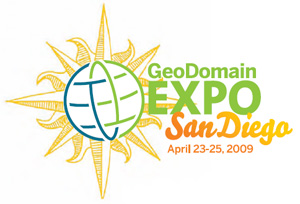| By
the time those issues were settled (with an agreement to move to a
non-profit trade association model owned by AC members) and a
March 16 announcement
was made declaring that the show would go on, AC leaders had only five
weeks left to put it together.
|
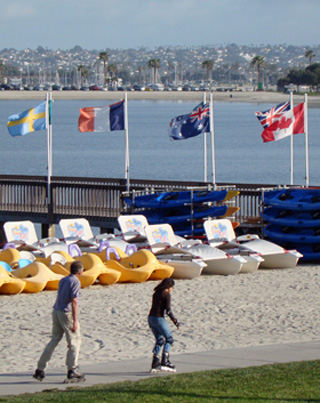
View
of San Diego's Mission Bay from our
2nd floor room at the Catamaran Resort |
An agenda had to be set,
speakers secured, programs printed, endless loose ends tied
up and, most important of all, any doubts potential
attendees had about going forward with their trip in the
wake of the uncertainty had to be dispelled. That would be a
tall order for the average person to pull off in such a
short time frame. Fortunately, AC leadership is not made up
of average people. They have proven to be some of the
brightest, most resourceful entrepreneurs I have met in any
profession and I felt if anyone could get it done, this
group could and when all was said and done they did.
The San Diego show not only lived up to
the standards set in Chicago
last year and San
Francisco the year before that, it set some standards
of its own, especially with respect to the timeliness of
the conference theme - how geodomain owners can monetize the
historic collapse of traditional media. I have no doubt that
most attendees came away from the show with enough fresh
ideas on that topic to pay back their conference expenses
many times over.
|
|
| Now that we have set the stage,
let me take you along for the ride as we travel through GeoDomain Expo show week in San Diego. I flew across the
U.S. from our home base in Tampa, Florida and arrived
at the Catamaran late Wednesday afternoon (April 22). The
public Expo wouldn't open until the following evening,
but I wanted to be in town to drop in on some of the |
| private sessions reserved for Associated
Cities members that are always held the day before the
official conference begins. That series of five seminars got
under Thursday morning (April 23) and continued throughout
the day.
While we are on the topic of AC members, this is a good
time to clear up some confusion about
Associated Cities and its Expo. Associated Cities members
are all .com city domain owners (for example, the AC roster
includes the owners of LosAngeles.com, Chicago.com,
Atlanta.com, NewOrleans.com and Nashville.com
to name just a few). Because the organization has this
tight focus, many think that the GeoDomain Expo shares the
same focus. To the contrary, the conference is open to everyone
- and more importantly it has something to offer
everyone who is interested in developing their domains,
regardless of the extension or subject matter. To be sure,
the GeoDomain
Expo has a tight focus of its own - but that focus is domain
development, period. |
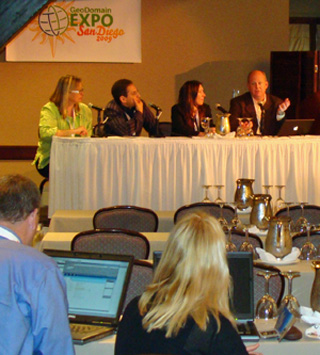
Scene
from one of the Associated Cities
members only seminars Thursday (April 23). |
You will also find the AC members to be
exceptionally friendly and free with their advice on building out
domains. They all have a track record of successful
domain/business development, so you will not find better tutors
anywhere. That is why the show attracted an immediate following that
has remained loyal and confident they will get their money's worth
from being there. Despite occasional disagreements among its entrepreneurial
leaders over the best path forward, the association and its expo are
built on an idea that cannot be killed - working
together for the common good so that anyone who wants to grab a
piece of the new media world pie is given an opportunity to do that.
|
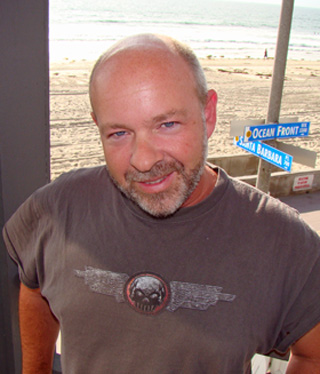
Dale
Porter on the 2nd floor balcony
of his oceanfront condo in San Diego |
One of the nice things about conferences is
that they are always held in attractive locations. On that
score, San Diego was certainly a home run and the hosting AC
member, Mark Burgess of SanDiego.com, made sure attendees
had a chance to enjoy the attractions of one of the
world's most beautiful cities. The show venue, the Catamaran,
sits on a narrow strip of land that has Mission Bay on one
side and the Pacific Ocean just a few hundred yards
away on the other.
During the private member sessions I slipped
out for a couple of hours to enjoy a stroll down the walkways
that run alongside both the ocean and the bay. I headed south
to visit veteran domainer Dale Porter (whom many know
as Juniper Park on the domain forums). Dale lives in an
oceanfront condo just a mile south of the Catamaran where he
works from a home office that looks directly down on the beach
and a gorgeous view of the Pacific. His biggest problem is
dealing with the salt air that can corrode connections in the
computers and peripherals scattered around his desk. A small
price to pay for being able to spend every day in
paradise. |
I was back at the Catamaran in time for the
Expo's official opening event, a luau, sponsored by MojoPages,
on the hotel's bayfront lawn that got underway at 6pm Thursday. It
was a great setting to get together with old friends and meet
new ones attending their first GeoDomain Expo.
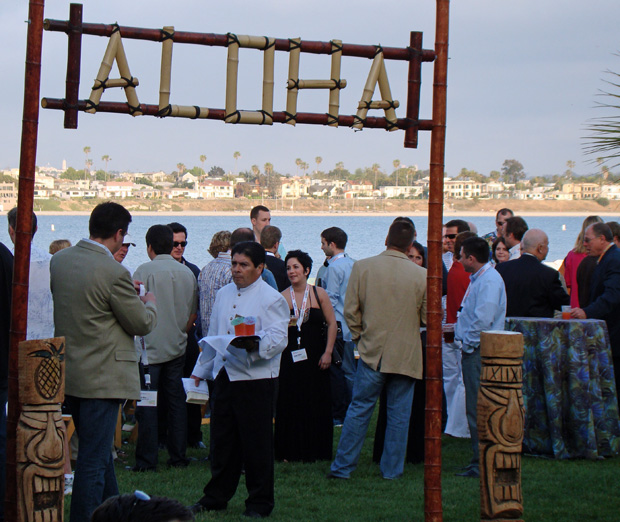
Opening
night luau on Mission Bay April 23 gets the 2009
GeoDomain Expo underway.
|
The first day of business began bright and
early Friday morning at 9:15 with welcoming comments from San
Diego Mayor Jerry Sanders, followed by a State
of the Industry talk |
| delivered by Associated Citiies President Dan
Pulcrano (of Boulevards
New Media). Pulcrano gave a well balanced speech
that
covered both the incredible opportunities and the potential
hurdles facing geodomain owners as they set about the
formidable task of replacing traditional print and broadcast
outlets as the dominant force in local media.
Pulcrano said the job may look daunting but it is
definitely doable, noting "The kinds of gains we are
seeing after investing time and energy in our sites has been
phenomenal." As the owners of more than two dozen major
.com city domain names (including LosAngeles.com, SanFrancisco.com,
Seattle.com and Dallas.com) and as the
publisher of multiple print publications, Pulcrano's
company, Boulevards New Media is especially well
positioned to see the mind-boggling possibilities as media
continue to migrate to the web. Pulcrano said revenue at
Boulevards jumped 20% in the first quarter of this
year, in stark contrast to the freefall in revenue being
experienced by major newspapers. |
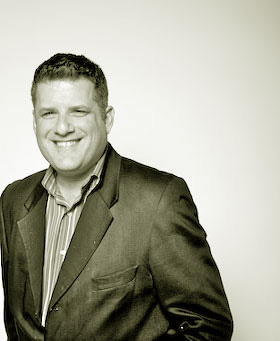
Associated
Cities President Dan Pulcrano
(Photo courtesy of Dina
Scoppettone) |
The show's first panel discussion focused on
"GeoDomain Nuts & Bolts: Development & Monetization"
and featured Elliot Silver (Lowell.com and Burbank.com),
Shaun Pilfold (Kelowna.com), Michael Neu (Lahaina.com)
and Becky Thielen (Scottsdale.com). Barry Hodge of Boulevards
New Media (formerly with Richmond.com) moderated the
session.
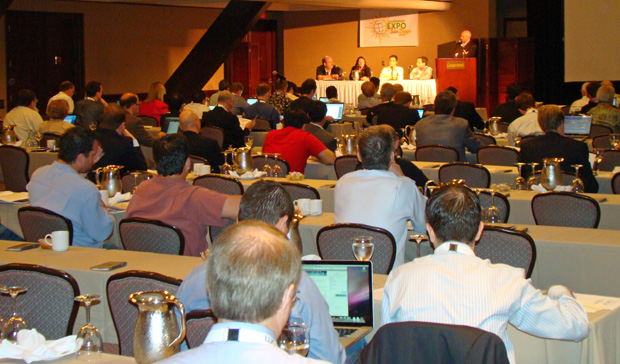
Opening
seminar at the 2009 GeoDomain Expo Friday morning (April 24)
Neu provided an interesting slide presentation
that covered the key steps to take in building a site from scratch
as he has done with Lahaina.com. He touched all of the bases
including how to determine what you want your site to look like
(make sure the graphic theme reflects your community), important
decisions you'll need to make in the development process
(outsource or stay in house? Build in social media and ad platforms,
etc.), as well as ways to build brand awareness (for example use Facebook
and Twitter, SEO and cross promote with local businesses).
I sat on the next panel, "Dailies:
They're Gone, Now What?," along with Ron Donoho (SanDiego.com)
and Kery Murakami (Seattle Post-Globe). Dan Pulcrano, who
is a veteran reporter, editor and publisher moderated.
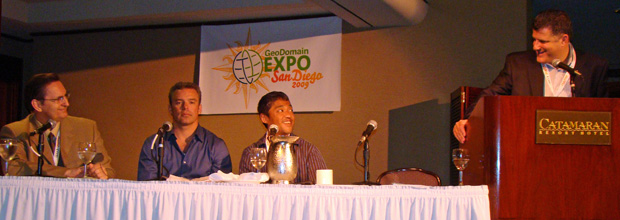
Left to right: Ron Jackson,
Ron Donoho, Kery Murakami and moderator Dan
Pulcrano
discuss "Dailies: They're Gone, Now What?" in a Friday
morning seminar.
Murakami was a reporter for the Seattle
Post-Intelligencer, the major newspaper that recently shut
down its print operations to become an online-only publication.
Murakami talked about how he and other displaced
Post-Intelligencer staffers are trying to compete with their own
full-featured news site at SeattlePostGlobe.org.
In effect, Murakami and his friends, wisely I think, made the
decision that if you can't beat them (the web) join them. Too many
traditional media outlets have not yet come to grips with the fact
that they are not going to be able to compete with the Internet as a
delivery platform. Those who continue to ignore that fact will
continue to be forced out of business.
Donoho and I both spoke in favor of the online
magazine model because it can be executed with much smaller expense
and staff requirements than a broad based site that tries to stay on
top of breaking news in many different categories. We suggested that
a team as small as a single reporter and photographer could go into
business for themselves covering a specific well chosen niche
and be successful at it. With so many general news options to choose
from on the web, being the best site about a specific
topic might offer a better shot at success than spreading your
resources too thin by trying to be everything for everybody.
The lunch break featured
an address from Chris Tolles, the CEO of news
aggregation and commentary giant Topix,
a new media colossus that attracts 10 million monthly
visitors. Tolles also worked for four traditional media
giants; newspaper publishers Gannett, McClatchy,
Knight-Ridder and the Tribune Company, so he
is intimately familiar with the current sea change from old
media to the new world online.
Tolles said that being
"local" is the key to future success - a comment
that was obviously music to the ears of the geodomain owners
in the audience. "There is a huge opportunity to be the
site that ties people together in a community," Tolles
said. He added, "Local advertising is going to be the
biggest area growth and folks like yourselves are well
positioned to get that revenue as traditional media
fades." As an example Tolles noted that a ton of local ad
money that has been spent on Yellow Pages in the past
will be following consumer eyeballs away from giant books
that are becoming obsolete and on to the web.
|
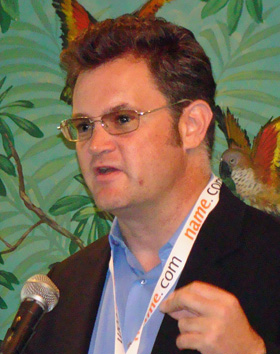
Chris
Tolles
CEO, Topix.com |
|
After lunch I moderated a panel
devoted to "Newsmakers and Buzz Generators"
that included Elliot Silver (ElliotsBlog.com), Andrew
Allemann (DomainNameWire.com) and Sean Stafford
(who has written for Modern Domainer Magazine).
If you want to operate a |
| successful blog or news site, one thing we all
agreed on was the importance of developing your own unique
identity - a "brand" that will make you stand out
in a crowd that will only continue to get larger.
Silver said that his "brand" included
publishing a lot of step by step case studies as he goes
through the development process with his sites like
Lowell.com and Burbank.com.
Allemann said he made his mark by filling a void by
covering daily breaking news in the domain industry as well
as taking on the task of producing time consuming
investigative pieces that require meticulous research and
fact checking before you can go public with them.
With DN Journal, my plan from day one |
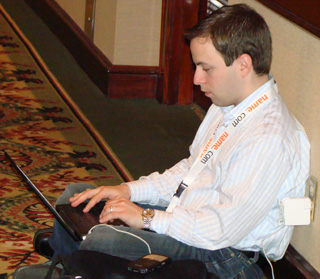
Elliot
Silver catching up on his blog
during a break between sessions. |
| was to make magazine length
profiles of successful entrepreneurs and key events the
signature of the publication. One thing I like about that
kind of content is that it has "legs" - meaning
that it can continue to attract readers and site visitors years
after the material was published. The important takeaway
from this session was that you need to find your own unique
niche or style that will give you a brand of your own on the
web. |
|
|
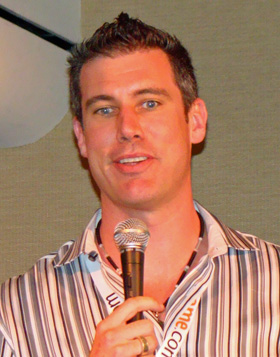
Databanq
CEO David Bayer speaking
during the Business Directories session. |
Next up was a seminar on
"Business Directories", one of the most
popular tools for monetizing local websites. Those on the
dais included David Bayer (Databanq), Scott Paige
(New Media Broadcasting), Elaine Screnci (Acxiom),
James Chubb (eDirectory) and Jon Carder (MojoPages).
Their companies provide pre-populated
local business directories that can help your site become
the "authority" for such information. The listings
also attract revenue from local advertisers who are moving
online and pull in new traffic from search engines that will
index the listings. Bayer noted the size of the opportunity
for local sites saying that forecasters expect $16
billion in Yellow Pages advertising revenue to move to online
listings.
Friday's final seminar addressed "Building
the Brand, Extending Your Reach" with comments from
panelists Truman Hedding (LosAngeles.com), James
Earwicker (CEO, San Diego.com) and Tim
Breidigan (Eventful.com). Kyu Kyung (SFStation.com)
|
| served as the moderator. Hedding
provided useful tips on ways to use social networking to
inexpensively market your site. He spelled out the
advantages of using Facebook Pages and Groups and how
to get the most out of Twitter, including ways you may not
have thought of such as using the micro blog service to
follow what your competition is doing and using an intern to
answer questions about your business. Of course Twitter also
gives you a free platform to provide information about your
business and with its search functions and interactive
capability Hedding said Twitter is essentially a Two-Way
version of Google.
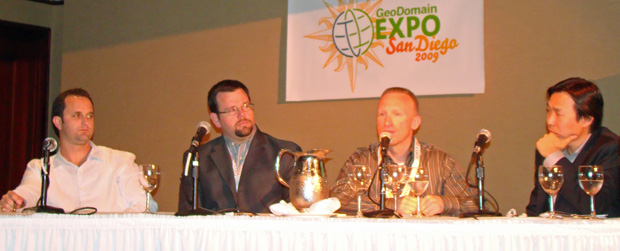
Left
to right: Truman Hedding, James Earwicker, Tim
Breidigan & moderator Kyu Kyung
discuss "Building the Brand and Extending Your Reach"
Friday afternoon (April 24). |
With the day's business out of the way,
attendees gathered for a bountiful buffet dinner that included a
visit from Ingrid Croce, the widow of famous singer Jim
Croce and a San Diego resident was was instrumental in the
development of the city's fabulous entertainment district, the
Gaslamp Quarter. Ingrid filled us in on what to expect then we
got to see it first hand which we did when double decker tour buses took everyone
to Fleetwood, one of the quarter's hottest night clubs, for
the official GeoDomain Expo Party that was sponsored by HotelPlanner.com.
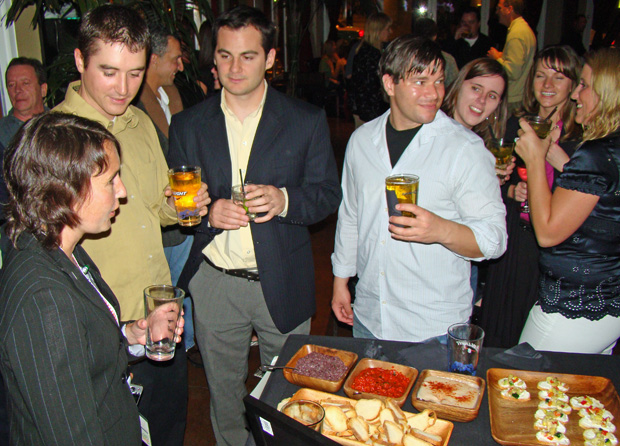
Scene
from the 2009 GeoDomain Expo Party Friday night (April 24) at
Fleetwood in San Diego.
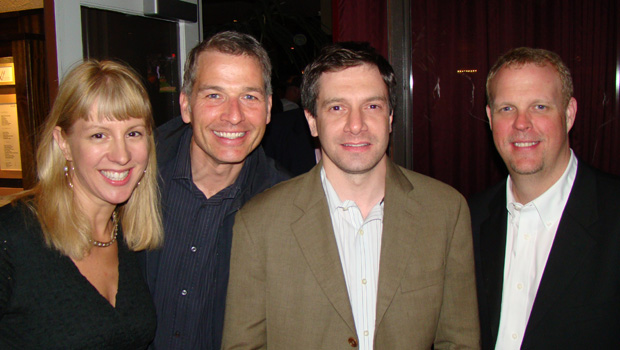
Catching
some air on Fleetwood's outdoor patio are (left to right): Sara
Mannix (Albany.com), Mark Huttram (Kelowna.com),
Associated Cities Co-Founder Josh Metnick (Chicago.com) and Ian
Hartten (Toledo.com).
The closing day of the Expo Saturday (April 25)
got started with the conference keynote address from noted
futurist/author Dr.
David Brin, who also happens to be a San Diego resident.
Brin said the day may be coming when bankrupt newspaper will sell
their brand name and assets to .com city domain owners - an
unthinkable scenario until the traditional media collapse that is
playing out before our eyes now began picking up steam.
While other speakers
talked about the value of using social networking sites like
Facebook and Twitter to promote yourself and your site, Brin
was less enthusiastic about them. As an a prolific writer
who has penned close to 30 books, Brin laments the lack of
intelligent discourse on the social networking sites.
"These things are like lampreys on your neck, sucking
out your time, your attention and your lifeblood!" Brin
said.
Brin went on to enthrall the audience
with predictions about future technological developments.
One I particularly liked was a pair of computerized glasses
that, using facial recognition technology, would immediately
identify everyone you meet and flash their name on the
inside of the lens (plus the names of their wife and
children) and other useful information about that person. I
would buy a pair of those now!
After Brin's talk a panel on "Travel Industry
Tips & Tricks" brought everyone back from the
future to the present. This panel featured Chad
Montgomery (Expedia Affiliate Network), |
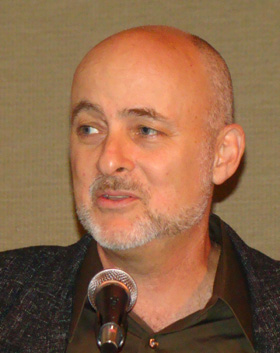
Dr.
David Brin delivering his keynote
speech Saturday morning (April 25). |
| Bas Perik (Booking.com), Ron
Kazmiersky (Advanced Reservation Services) and Jeff
Roberts (Kayak.com). The beauty of geodomains is that
they are extremely versatile. They can be used as a local
news site, city magazine or, as many are used today, as a
tourist information site. For the latter purpose the travel
industry affiliations and services provided by the companies
represented in this session are a godsend. |
|
|
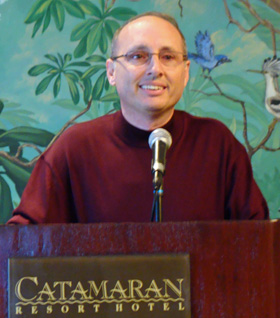
Borrell
Associates CEO Gordon Borrell
during his
luncheon talk Saturday |
The Saturday lunch break
featured an inspiring talk from Borrell
Associates CEO Gordon Borrell. His
company tracks local advertising trends and Borrell
assured the geodomain owners in
attendance that they are perfectly positioned for the
massive transition of local ad spending from traditional
media outlets to the web.
"The
web represents the Holy Grail for small
businesses," Borrell said. "It is inexpensive
advertising that hits its target - it's exciting and it's
new." Those are extremely valuable attributes when you consider
that $120 billion is spent annually on local
advertising."Borrell urged attendees to believe in
what they are doing and bet on themselves, "I don't
think you are investing enough in what looks like a sure
bet with the Internet," Borrell said, adding
"Don't think small. Think big and I think you
will win big."
After
lunch "The Future of GeoDomains and New TLDs" was
discussed in one of the show's
|
| most
highly
anticipated and interesting panel sessions. The
speakers included Internet Commerce Association Legal
Counsel Phil Corwin, Jothan Frakes (Minds+Machines)
and the Castello Brothers, David and Michael
(Castello Cities Internet Network). ICANN's Chief
Registrar Liaison Tim Cole served as moderator.
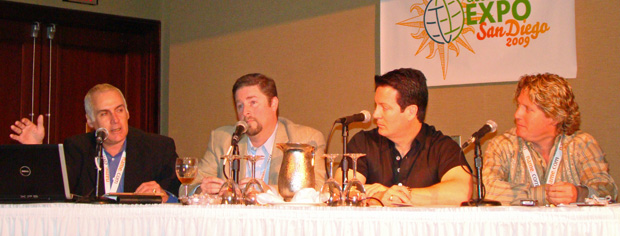
During
the "New TLDs" session, ICA Legal Counsel Phil
Corwin (at far left) makes a point
while fellow panelists Jothan Frakes, David
Castello and Michael Castello listen in. |
Corwin
said ICANN's plan to roll out an unlimited number of new gTLDs
starting early next year will come with many risks to current domain
owners. Under heavy pressure from trademark interests, ICANN
could change pricing and UDRP policies for the new gTLDs and
if that happens the existing extensions will demand the same
changes. Those could include implementation of disastrous policies like
"differential" pricing - allowing registries to charge
whatever renewal/registration fee the registry thinks an individual
name is worth). Corwin said it is critical that domain owners pay
close attention to the process which he frequently posts about on
the ICA
website. "Ignorance is not bliss," Corwin
said. "When you find out this stuff has been finalized it is
too late to change the game."
Frakes,
whose new company, Minds+Machines, provides consulting services for
those who plan to apply to operate a new extension said new TLDs are
definitely coming so people in the industry need to consider how
they can leverage that impending event.
|
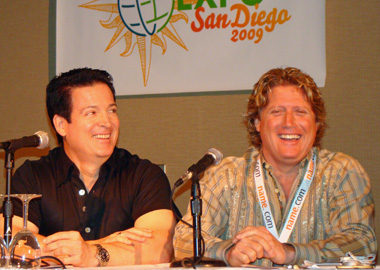
David
& Michael Castello |
David
Castello is hopeful that the tide can still be turned,
noting "There is little to zero demand for new
extensions and ICANN could be opening a Pandora's Box
that they won't be able to control. Unlimited new gTLDs will
trigger a trademark violation mania that could come back to
bite all of us."
Michael
Castello said he had no problem with a few well chosen new
extensions for which there is a demonstrable need but asked,
"500 new extensions, where is the need for that?
What is the benefit for the greater good of the people? I
don't see it."
While
there may be little or no
|
| benefit
for the man on the street, the plan could create a windfall
for ICANN who plans to charge a $180,000 application fee
for each new extension. That prompted David Castello to
observe, "for a non-profit organization, ICANN is
behaving an awful lot like a for profit corporation."
Incidentally, the
Castellos are also making their views known inside ICANN as they
are members of the DNS governing body's Business
Constituency. They are also members of the Internet Commerce
Association and urged attendees to support the ICA's efforts
on behalf of the domain community. "It costs 80 cents a
day to be
a member of the ICA," David Castello said,
adding "There is no reason for anyone in this room to
not be a member of the ICA." |
At
mid-afternoon the show moved outdoors for a GeoDomain Town Hall meeting
in which AC members and attendees could bring up any issues that
were on their minds. Associated Cities Executive Director Patrick
Carleton presided over the event on the Catamaran lawn, just
steps away from the Mission Bay beachfront.
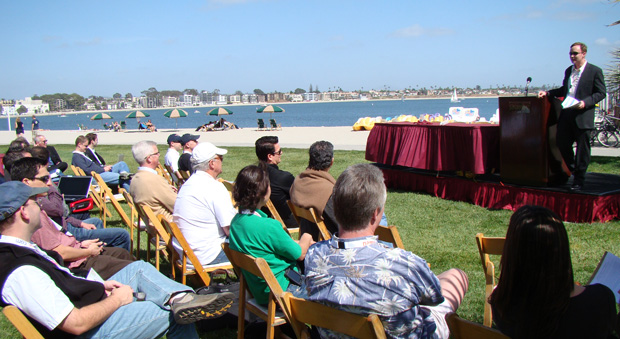
On
a beautiful afternoon in San Diego Associated Cities Executive
Director Patrick Carleton
(at the podium) conducts an outdoor GeoDomain Town Hall
meeting.
Everyone
stayed in place for the industry's first live outdoor domain auction
presented by DomainConsultant.com and Aftermarket.com.
The auction, focused on geo related domains, wound up producing just
over $100,000 in sales, led by SierraMadre.com at $15,000,
TowerOfLondon.com at $10,000 and BrooklynJobs.com
at $8,000. After the show ended, an extended online auction
produced another $208,844 in sales, raising the the final tally from the Expo's auction catalog to $303,683.
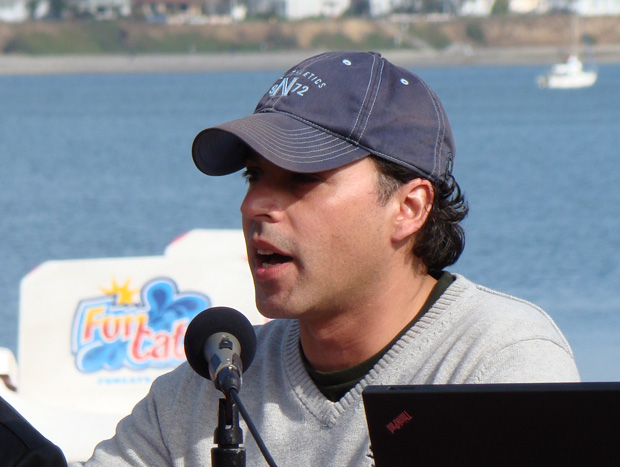
Miguel
Fiol (DomainConsultant.com) conducts the live domain auction
Saturday (April 25).
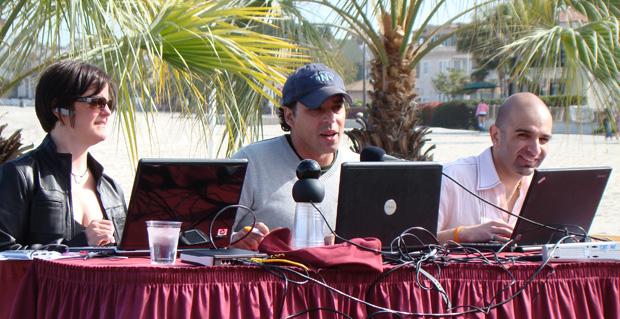
Susan
Prosser (left) and Ammar Kubba (right) from Aftermarket.com
help Fiol keep an
eye on bidding on the Internet as well as in the house (or should I
say on the beach).
After
the auction, attendees continued to enjoy the sunshine and fresh sea
breezes during a show closing networking party sponsored by
SanDiego.com and Churchill's Cigars that included fine cigars for
those so inclined.
To
close the week on a high note for those staying over in San Diego
for dinner, Associated Cities helped organize registrants into
small dinner groups that then headed out to their choice of ten top
restaurants around the city. Diners were able to look over the
options and then sign up for a restaurant serving the kind of
cuisine they were in the mood for that night. An AC member led each
of the individual groups to their destination and a memorable
evening of great food and conversation.
I
signed up for a group attracted to the Northern Italian cuisine at Bella
Italia where we had a great night out led by AC's Skip
Hoagland and his wife Cathy. A member of our
party, Scott Ross, handed his camera over to an obliging
waiter who was kind enough to snap the photo for
posterity.
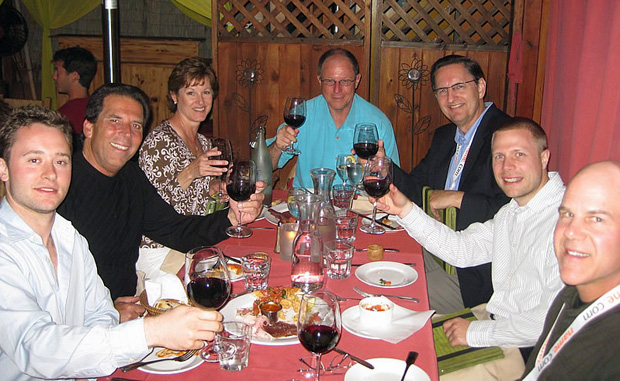
At
Bella Italia in San Diego Saturday night, April 25 (left to right): George
Stockum (WorldRealEstateListings.com), Scott Ross (Promediary.com),
Cathy Hoagland,
Skip Hoagland (Domain New Media Inc.), Ron Jackson (DN
Journal),
Colin Pape and Jim Terry (ShopCity.com).
A lot of people at Associated
Cities deserve credit for making this the rewarding show that it
was. In talking with AC President Dan Pulcrano and other members of
the association during the week, two people that were frequently
singled out for praise were AC Executive Director Patrick
Carleton (at left in the photo below) and SanDiego.com's Mark
Burgess (at right).
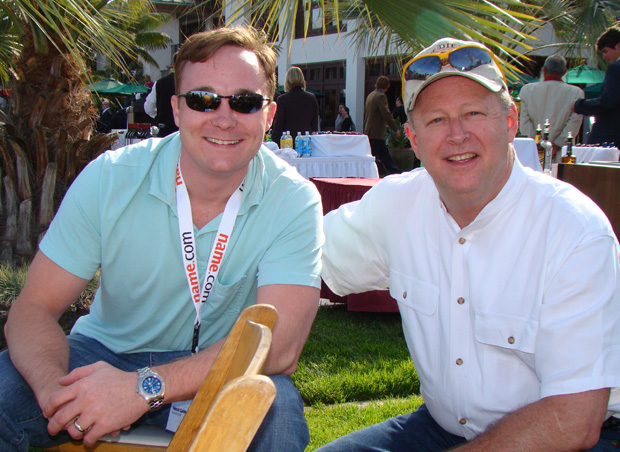
As I
flew out of San Diego Sunday morning I couldn't help marveling over
how well the GeoDomain Expo had been put together on such short
notice. With the luxury of several months of advance preparation
time, rather than a few weeks worth - the future potential of this
conference is unlimited. They offer unique content that
dovetails perfectly with exploding interest in domain development
and they can call on a stable of proven and personable entrepreneurs
from their nmembership to attract attendees that want to learn the
craft from the best the industry has to offer. That is a tough
combination to beat.
|









